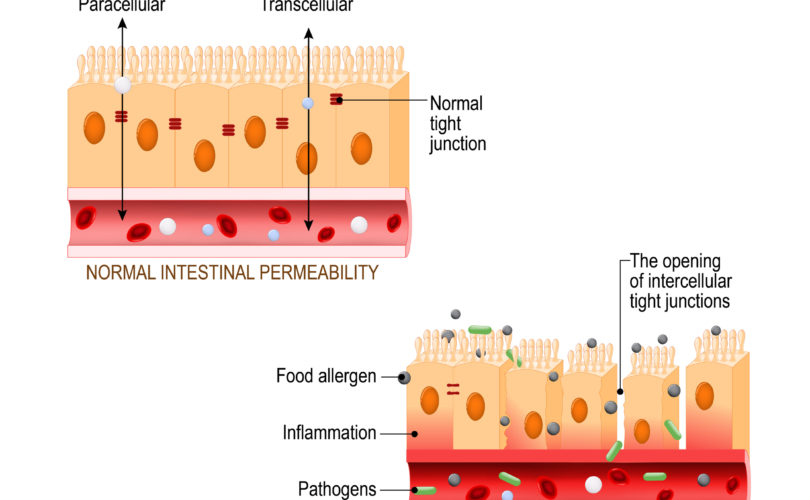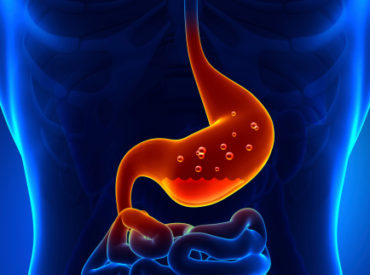Leaky gut (enhanced intestinal permeability) is becoming more common as more Americans are affected by chronic stress, high toxicity, poor diet choices and bacterial imbalance. Leaky gut is a warning sign that your body is more susceptible to autoimmune (AI) disease. So, intestinal hyperpermeability should be taken seriously and addressed to avoid an autoimmune condition.
What is leaky gut?
Inside our intestines, we have a single layer of specialized epithelial cells that are stitched together by tight junctions (proteins). When intact, tight junctions maintain the balance between allowing critical nutrients to enter your bloodstream (so they can get to your cells), while remaining small enough to prevent partially digested food, toxins and microbes (bacteria, virus, fungi) to get to immune tissue located under the gut lining.
Sometimes the stitching between the cells of the gut lining gets loose (the tight junctions breakdown) and the very small openings in your gut lining get wider. This makes the gut more permeable to larger molecules like undigested particles of food, toxins and microbes. When these molecules get to underlying immune tissue, it triggers inflammation, changes gut flora balance, and can lead to autoimmunity.
What causes leaky gut?
Some of the underlying causes of leaky gut include:
- Genetic predisposition — autoimmune diseases tend to occur in the same family (not the actual type of AI disease but rather the occurrence of autoimmunity). Certain people may be more susceptible to developing leaky gut because they have a heightened response to environmental factors that “trigger” their bodies into initiating autoimmune responses;
- Poor diet — our modern-day diet often includes processed and inflammatory foods such as un-sprouted grains, added sugar, GMOs, refined oils, and conventional dairy products;
- Chronic stress – stress and anxiety stimulate the adrenal glands to produce cortisol, which over short-durations can create a healthy immune response, but extended over long periods can lead to increased inflammation and damage to the gut lining;
- Toxin overload — we encounter over 80,000 chemicals and toxins every single year, but the worst ones for causing leaky gut include aspirin and NSAIDS, antibiotics, antidepressants, and birth control pills. Also, high drug and alcohol consumption can play a role;
- Lack of adequate vitamins and minerals – Vitamin D (which is important in maintaining the integrity of the tight junctions), Zinc, and antioxidant intake; and
- Microbial dysbiosis — an imbalance between beneficial and harmful species of flora in your gut (especially the presence of Candida and parasites). A large body of evidence now shows that gut microbiota is important in supporting the epithelial barrier and preventing autoimmune reactions.
How do you know if you have leaky gut?
1. Food Sensitivities
As previously mentioned, when the gut becomes leaky, molecules (which are much larger than the body prefers to absorb) are treated as foreign invaders (virus or bacteria) that trigger the body’s immune defenses. This sets off a cascade of antibody production. The immune system becomes hyper-vigilant and dysregulated—even attacking some of the foods you consume—resulting in food sensitivities. The most common sensitivities are dairy and gluten.
2. Inflammatory Bowel Disease
Some studies have shown that enhanced intestinal permeability is often localized to the colon in people suffering from irritable bowel syndrome and ulcerative colitis.
3. Autoimmune Disease
The key to understanding how leaky gut can cause an autoimmune disease is through the research done on a protein known as “zonulin.” Zonulin loosens the stitching between epithelial cells that line the gut causing intestinal hyperpermeability. One of the most important triggers for zonulin release is gluten (a protein found in wheat). Even in people who do not have celiac disease, the gluten and gliadin proteins that are found in wheat can trigger the release of zonulin and increase enhanced intestinal permeability.
Intestinal hyperpermeability is often found to precede autoimmune disorders. The good news is that, at least as far as leaky gut plays a role in autoimmune conditions, it is reversible and could potentially alleviate some of these problematic immune responses.
4. Thyroid Problems
One of the autoimmune diseases that leaky gut may directly affect is Hashimoto’s disease. Also known as “autoimmune thyroiditis,” an autoimmune disease where the body attacks the thyroid gland and diminishes its ability to create hormones—ones that control metabolism. Because of its autoimmune component, people with Hashimoto’s are at a higher risk of developing other autoimmune diseases as well.
5. Inflammatory Skin Conditions
As the tight junctions in your intestinal lining break apart, harmful substances enter your bloodstream, leading to inflammation that can cause and aggravate skin conditions like rosacea and eczema.
6. Mood Issues and Autism
Increased intestinal permeability leads to detrimental effects on the host immune system, which have been demonstrated in diseases such as inflammatory bowel disease (IBD), diabetes, asthma and psychiatric disorders including depression, anxiety and autism.
How do you get rid of leaky gut?
In my practice I concentrate on the following steps to heal leaky gut:
- Remove foods and factors that damage the gut. I usually start with removing gluten and dairy. If food sensitivities have been identified, then removing those as well is necessary. The purpose of this step is to calm the immune system to set the stage for healing.
- Replace these problem foods with healing foods—usually those that are anti-inflammatory in nature.
- Repair the gut with specific leaky gut supplements.
- Rebalance your microbiome with probiotics (beneficial bacteria).
These steps can take from three to six months or longer depending on your circumstances. With the right program, you can repair your gut lining and move past leaky gut. Healing a leaky gut is also an instrumental part in reversing autoimmune disease.







